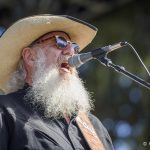Tim O’Brien on Woody Guthrie 100
Woody Guthrie would be turning 100 this year. The Guthrie family and The Grammy Museum have joined forces for a cross country celebration of this notable centennial. As part of the festivities, the historic Brady Theater in Tulsa will host a musical birthday bash honoring Guthrie and his music on March 10. Although he won’t be there in person, Woody Guthrie’s spirit is surely reflected in this remarkable lineup that includes John Mellencamp, Arlo Guthrie, The Del McCoury Band with Tim O’Brien, Rosanne Cash, Old Crow Medicine Show and Okie-rooted Jimmy LaFave, Hanson, and The Flaming Lips.
This diverse “confirmed” group of performers (the Grammy Museum’s executive director, Bob Santelli, tells me there will be some pretty big “surprise” additions right up to the last minute…) is testament to the wide-ranging and significant influence Guthrie and his music continue to exert almost half a century after this folk hero’s death. I recently had the opportunity to catch up with the very talented Tim O’Brien. At the time, he was in the UK as a featured performer on the Transatlantic Sessions Tour. In deference to the time difference, we communicated by email about Guthrie and his legacy.
JWW: How has the legacy of Woody Guthrie’s music, lyrics and life influenced your own approach to your music and your songwriting?
TO’B: Like Woody Guthrie, I come from a small town and left there with music as my main source of income. And like him, I gained perspective about my home by traveling away from it. Using his music to make the world a better place, Woody provided a great example to those who followed him. He meant to perform and to write songs in such a way as to give people not only entertainment, but also hope and solidarity in their common struggles. He taught me that music is best when it brings people together.
JWW: Do you think, in this day and age, songwriting can still be a political act? A useful method of effecting change?
TO’B: Change is the one thing that’s constant in the world, so we’re all part of the process, but yes, an artist can show what others see in a new light and help hasten the process of change. We sort of underline and confirm what others have seen. We provide a new perspective, or more simply provide a medium and a moment where people can reflect.
JWW: With your roots in bluegrass, country and folk, do you bring aspects of this to your own songwriting? If so, could you give me an example?
TO’B: The closest I have come is a song I wrote with Gary Nicholson called “More Love”. It wasn’t so much politics we dealt with though that’s part of it. After writing it, I was happy because I thought the song could be sung by a commercial artist and get radio airplay conveying a positive message with some political comment. The Dixie Chicks then recorded it on their HomeCD. It was slated to be their next single until the fallout from their anti-Bush stance came down. So it didn’t get the chance I’d hoped for, but I feel it was a success to have that song end up in 6 million homes!
It’s hard to measure the effect of things at the time. I’m sure Woody got good feedback in his day, but he couldn’t have known “This Land is Your Land” would find it’s way into millions of school books. People like Dylan, Springsteen, and U2 have made some good anthems for positive change. I’m sure there will be more to come.
JWW: Any thoughts on what you will be performing at this show?
TO’B: I’ve been asked to sing “Jesus Christ”, “Pastures of Plenty”, “So Long It’s Been Good To Know Ya”, with the Del McCoury Band, and to sing “The Sun Jumped Up” with the Old Crow Medicine Show.
-With permission from The Current.




